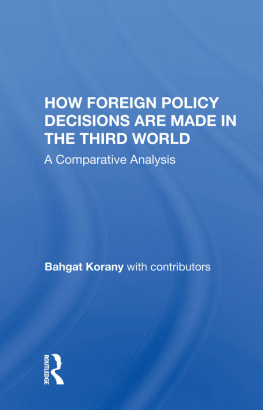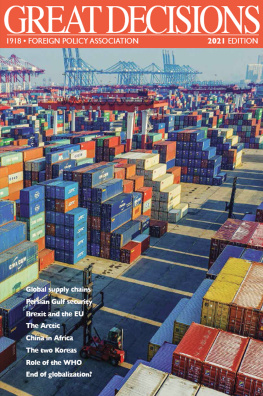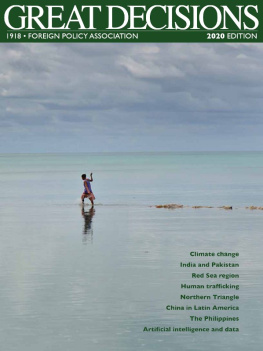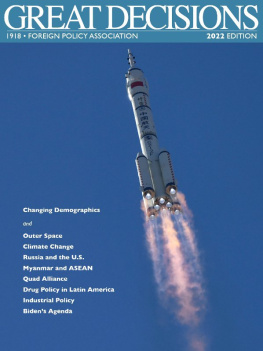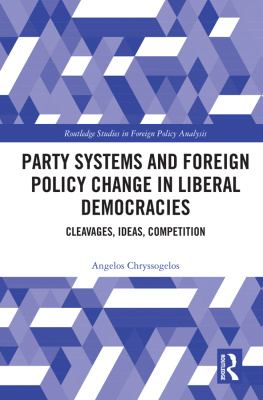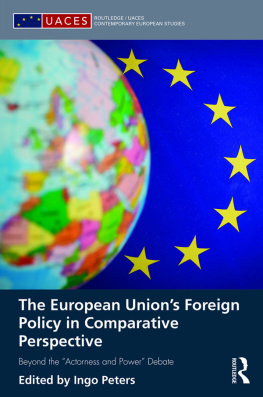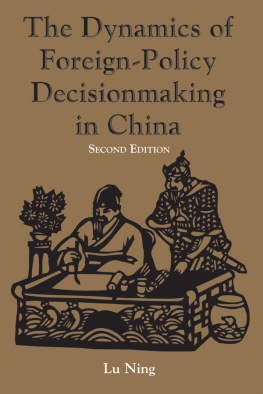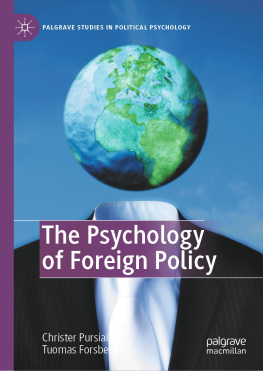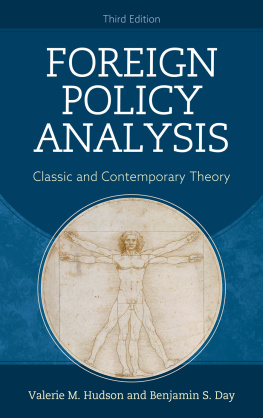HOW FOREIGN POLICY DECISIONS ARE MADE IN THE THIRD WORLD
Also of Interest
The Dynamics of Latin American Foreign Policies: Challenges for the 1980s, edited by Jennie K. Lincoln and Elizabeth G. Ferris
Latin American Nations in World Politics, edited by Heraldo Muoz and Joseph S. Tulchin
The Making of Foreign Policy in China: Structure and Process, A. Doak Barnett
Militarization and the International Arms Race in Latin America, Augusto Varas
Cuba's International Relations: The Anatomy of a Nationalistic Foreign Policy, H. Michael Erisman
The Third World Coalition in International Politics, Second, Updated Edition, Robert A. Mortimer
The Indian Foreign Policy Bureaucracy, Jeffrey Benner
The OAU After Twenty Years, Amadu Sesay, Olusola Ojo, and Orobola Fasehun
China and the World: Chinese Foreign Policy in the Post-Mao Era, edited by Samuel S. Kim
Nonstate Actors in International Politics: From Transregional to Substate Organizations, Phillip Taylor
Economic Diplomacy: Embargo Leverage and World Politics, M. S. Daoudi and M. S. Dajani
The Foreign Policies of Arab States, Bahgat Korany and Ali E. Hillal Dessouki
The Caribbean Challenge: U.S. Policy in a Volatile Region, edited by H. Michael Erisman
Latin America and the U.S. National Interest, Margaret Daly Hayes
Japan's Foreign Relations: A Global Search for Economic Security, edited by Robert S. Ozaki and Walter Arnold
Soviet-Third World Relations, Carol R. Saivetz and Sylvia Woodby
Available in hardcover and paperback.
About the Book and Author
This textbook analyzes eight crucial foreign policy decisions of the 1970s and 1980s, emphasizing how decision-making is influenced by the social characteristics of Third World states and their position in the global system. is devoted to an analysis of the decision-making process of a nonstate but influential Third World actorOPEC. The concluding chapter pulls the threads together, comparing existing theory with the findings and incorporating analyses from other parts of the Third World, especially India and China.
Written in straightforward language that avoids unwarranted jargon, the book analyzes foreign policy decisions as part of the Third World political process, bridging the subfields of comparative politics, international relations, and political economy. Each chapter ends with a bibliographical commentary that, in combination with the book's bibliography, provides a succinct survey of the literature in Third World studies, development, and international relations.
Dr. Bahgat Korany is professor of political science and director of the Arab Studies Program at the University of Montreal. He is the senior author of The Foreign Policies of Arab States (Westview, 1984) and author of Social Change, Charisma and International Behavior (1976), which was awarded the Hauchman Prize for 1976.
How Foreign Policy Decisions are Made in the Third World
A Comparative Analysis
Bahgat Korany
with contributors
First published 1986 by Westview Press, Inc.
Published 2018 by Routledge
52 Vanderbilt Avenue, New York, NY 10017
2 Park Square, Milton Park, Abingdon, Oxon OX14 4RN
Routledge is an imprint of the Taylor & Francis Group, an informa business
Copyright 1986 Taylor & Francis
All rights reserved. No part of this book may be reprinted or reproduced or utilised in any form or by any electronic, mechanical, or other means, now known or hereafter invented, including photocopying and recording, or in any information storage or retrieval system, without permission in writing from the publishers.
Notice:
Product or corporate names may be trademarks or registered trademarks, and are used only for identification and explanation without intent to infringe.
Library of Congress Cataloging in Publication Data
Korany, Bahgat.
How foreign policy decisions are made in the Third World.
Bibliography: p.
Includes index.
1. World politics1965-1975. 2. World politics1975-1985. 3. Developing countriesForeign relations administration. I. Title.
D849.K64 1985 327'.091724 85-3259
ISBN 13: 978-0-367-00836-9 (hbk)
Contents
, Bahgat Korany
, Bahgat Korany
, Cyril Kofie Daddieh and Timothy M. Shaw
, Bahgat Korany
, Jorge I. Domnguez and Juan Lindau
, Bahgat Korany and Selma Akbik
, Bahgat Korany
Specialists and nonspecialists agree that both the Third World and decision analysis are crucial political topics. The last all-Third World conference (the Seventh Nonaligned Summit, New Delhi, March 7-12, 1983) had a membership of 101 countries as well as 18 observers and 28 guest delegations from another 19 countries, international organizations (including 15 branches of the UN), and various national liberation groups. Decisions are the microcosm of politics: They deal with such basic questions as how political outcomes emerge and how choices are made. Analysis of decision-making is indeed among the approaches most widely used in both political analysis and the conduct of daily affairs, since policy-makers do make decisions, either explicitly or implicitly.
Yet not a single book exists on foreign policy decisions in the Third World. Data are either inaccessible or, because archival facilities are lacking in many Third World countries, unavailable. But we do not have the relevant concepts and analytical tools to determine, for example, why China invaded India in 1962 or why the Iran-Iraq War started in 1980. Thus it was thought useful to publish a revised and enlarged edition of the results of a project that has existed within the International Political Science Association since 1979. or less than half this bookwere published as a special issue of the Association's journal, the International Political Science Review, Vol. 5, no. 1, January 1984. The book thus aims to unearth data on how principal decisions in the Third World were made, but also to evaluate critically the conceptual apparatus used in present decision-making theory.
In short, conceptual problems appear in dealing with any Third World country. For example, Tunisia (whose political importance has greatly increased since it became the new headquarters of the twenty-one-member Arab League in 1979) is representative of many countries in the Third World. A North African state of around 7 million people, Tunisia gained its political independence in 1956 after more than seventy years of French colonization. Since then it has been headed by Habib Bourguiba, a presidentmonarch now eighty-one years old, Bourguiba, then, is a basic facet of Tunisia's political life.
For instance, in downtown Tunis the main street is callednaturally Bourguiba Street. When taking the metro downtown, I asked a local fellow-passenger which stop was nearest Bourguiba Street. He did not seem to understand, and it took some discussion before I grasped the fact that in almost every small town, there was probably a Bourguiba Street. Indeed, Bourguiba is omnipresent: as an imposing statue on horseback in the center of the capital, or on the currency, in the press, on the radio, and in official political culture. Every day before the main eight o'clock news one can see "Guidelines from the President," a program in which Bourguiba talks to his people about all that has been accomplished in Tunisia since he headed the independence movement in 1934 and advises his people on the path Tunisia should take when he is no longer there. Bourguibism is not only everywhere but appears alive and well, unaffected even by the health problems of the ailing president. In this book I call such a conceptual lens the "great man" theory of history. This approach reduces all political and social phenomena in Third World countries to the man at the top. It is a personalistic and simplistic view, one that confuses appearance with reality.


